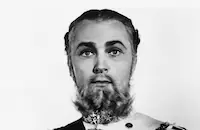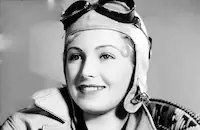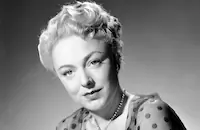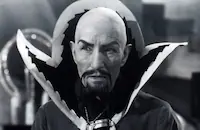Captain Fury

Brief Synopsis
Cast & Crew
Hal Roach
Brian Aherne
Victor Mclaglen
Paul Lukas
June Lang
John Carradine
Film Details
Technical Specs

Synopsis
In the 1840's, the pioneering days of the Australian bush country, Irish patriot Captain Michael Fury is arrested for his politics and shipped to an Australian penal colony to serve his sentence. Upon his arrival, Fury and his fellow prisoners are farmed out as slaves to Arnold Trist, the despotic land baron who considers himself the law, enforcing his edicts with whipping posts. After making a daring escape from prison, Fury meets Jeanette Dupre, the daughter of strict Mennonite François Dupre, and learns that Trist is trying to drive the settlers from the valley so that he can seize their land. Over Dupre's objections, Fury organizes the settlers to take action against Trist and returns to prison to recruit the convicts to the settler's cause. When Trist begins his campaign of terror at the Bailey ranch, Fury, abetted by convicts Blackie, Coughy and Bertie, rides to the rescue and thwarts Trist's men. As stories of Fury's escapades filter back to Sydney, the Governor of Australia decides to visit the back country and investigate. Meanwhile, Jeanette falls in love with Fury, and when her father forbids her to see him, she runs away. In revenge, Dupre tells Trist the location of Fury's hideout, but Trist double-crosses the Mennonite and imprisons him. The fugitives escape Trist's ambush, but when Dupre's house is burnt down and a charred body found in the ruins, Fury is arrested for the murder of Dupre and sentenced to hang. As the governor interrogates Fury before his execution, Blackie hears Dupre calling from his cell, rescues him and presents him, very alive, to the governor. His duplicity exposed, Trist attempts to escape, but is shot by a dying Coughy. After hearing the evidence, the governor grants Fury a pardon and places Blackie and Bertie in his custody.

Director

Hal Roach
Cast

Brian Aherne

Victor Mclaglen

Paul Lukas

June Lang

John Carradine

George Zucco

Douglass Dumbrille

Virginia Field

Charles Middleton
Lawrence Grossmith
Lumsden Hare
Mary Gordon
John Warburton
Claud Allister
Will Stanton
Edgar Norton
Margaret Roach

Billy Bevan
Edwin Brian
Nicholas Soussanin
Jack Lawrence
Leonard Willey
Dick Alexander
Philo Mccullough
Frank Hagney
Frank Moran
Jim Pierce
Gene Morgan
William Hall
Anna Ross
Crew
Harry Black
Norbert Brodine
Barney Carr
William De Mille
William De Mille
W. B. Delaplain
Gordon Douglas
Charles D. Hall
Marvin Hatley
Jack Jevne
Grover Jones
William Randall
Hal Roach
Hal Roach Jr.
Roy Seawright
W. L. Stevens
William Ziegler

Videos
Movie Clip


Film Details
Technical Specs

Award Nominations
Best Art Direction
Articles
Captain Fury
The scenario is set in late 19th century Australia, where the latest of a series of convict ships has put in with its unwanted human cargo. Counted amongst the freight are the Irishman Michael Fury (Brian Aherne), a once-celebrated military officer whose fall to his present circumstances is never really explained, and his contemplative, consumptive cellmate, the compassionately-nicknamed Roger "Coughy" Bradford (John Carradine). Once ashore, the convicts are promptly bound over for hard labor in the service of the local gentry, with Fury and Coughy assigned to one of the cruelest, the grasping land baron Arnold Trist (George Zucco). When he's not enforcing the inhumane conditions he maintains for his involuntary staffing, Trist seeks to expand his empire by pursuing less than legal designs on the properties of his impoverished settler neighbors.
Once placed in Trist's tender care, it isn't long before Fury is called out by Blackie (Victor McLaglen), the labor camp's alpha male; the good captain wins the respect of all when he bare-knuckles the beefier man to a standstill. Rather than suffer a whipping at the hands of Trist's thugs for a minor insubordination, Fury goes over the wall; Trist is confident that a settler will return him for the standard escapee bounty. The fleeing Fury makes the acquaintance of one such opportunist, the attractive young Jeanette Dupre (June Lang). While under her watch, Fury gets to see firsthand the bullying and exploitation the locals suffer from Trist, and resolves to put an end to it. Brazenly returning to Trist's camp, he engineers a breakout for Blackie, Coughy and a handful of other trustworthy inmates. Fury enlists their help in forming a Merry Men-like pack of vigilantes that will likely ride to the rescue when the settlers are being strong-armed by Trist's forces.
And ride in they do, taking the conflict to its conclusion in a more than serviceable swashbuckler that plays out like a Western with the occasional antipodal trappings, like the small packs of kangaroos and emus that Roach loosed on the Malibu location. It also helped that Roach coached energetic work out of a capable cast. McLaglen doled out his trademark macho bluster to good effect, and Carradine seemed to have had fun with the unaccustomedly sympathetic role of Coughy. Period ingénue Lang made a winsome heroine, and Paul Lukas registered well as her pride-bound, puritanical father. Zucco reliably delivered the preening villainy, as did Douglass Dumbrille and Charles "Ming the Merciless" Middleton as his chief lieutenants.
Cast in the lead, the handsome British actor Brian Aherne took on the assignment to finish out a two-picture pact with Roach that started with the comedy Merrily We Live (1938). In his 1969 autobiography A Proper Job (Houghton Mifflin), Aherne asserted that Roach's original intent had been to adapt Marcus Clark's 1874 novel For the Rest of his Natural Life, a grueling account of the horrors of the Australian penal existence. After failing to procure the rights, Roach had a tale with similar elements crafted. Aherne admittedly didn't quite know what to make of Roach's on-the-fly approach to filmmaking, as he recounted Roach's response to a take that ended with Fury riding off to catch up with Jeanette. "'Brian,' he whispers, 'you smiled when you went out of the shot. That's not right.' 'Oh?...But you told me I saw the girl over there.' 'Yes, that's right--but you're mad at her!' 'Am I? Why?' Hal reflects for a moment and then he gives me a charming Irish wink. 'I'll tell you tomorrow!'"
Aherne came to Captain Fury directly after the assignment that's generally regarded as his career high spot, his Oscar®-nominated turn as the Emperor Maximilian in Juarez (1939). "Captain Fury seemed like such a farrago of nonsense to me that I was very happy to know that Juarez would rescue me by coming out at about the same time," the actor recounted in his autobiography. "Well, Juarez turned out to be a highly respected box-office flop while Captain Fury cleaned up and went on playing all over the world for many years with countless television runs." The film wound up receiving an Oscar® nomination for Charles D. Hall's art direction.
Producer: Hal Roach
Director: Hal Roach
Screenplay: William C. de Mille, Jack Jevne, Grover Jones
Cinematography: Norbert Brodine
Film Editing: William H. Ziegler
Art Direction: Charles D. Hall
Music: Marvin Hatley
Cast: Brian Aherne (Capt. Michael Fury), Victor McLaglen (Blackie), Paul Lukas (Francois Dupre), June Lang (Jeanette Dupre), John Carradine (Coughy), George Zucco (Arnold Trist).
BW-91m.
by Jay S. Steinberg

Captain Fury
Quotes
Trivia
Notes
According to a news item in Hollywood Reporter, the production of this film was split into two units in order to take advantage of good weather on location in Malibu, CA. Another news item in Hollywood Reporter notes that this picture marked the first important acting role for Margaret Roach, the daughter of producer-director Hal Roach. A production still from the film includes Gibson Gowland in the cast, but his appearance in the released film has not been confirmed. Art director Charles D. Hall received an Academy Award nomination for his work on the picture.

Miscellaneous Notes
Released in United States 1939
Released in United States 1939













